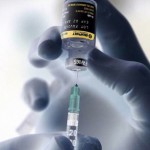Trans-Pacific Partnership Deal Undercuts Biological Invention
 (A version of this Health Alert was published by the Washington Examiner.)
(A version of this Health Alert was published by the Washington Examiner.)
“For want of a nail the shoe was lost; for want of a shoe the horse was lost; for want of a horse the battle was lost; for the failure of battle the kingdom was lost — All for the want of a horse-shoe nail.”
That proverb reflects what could be the fate of the Trans-Pacific Partnership, the multilateral trade agreement the United States and 11 other Pacific Rim countries recently signed after seven years of negotiation. What all of the countries have in common is a commitment to overcome domestic political obstacles to expanding free trade. Unfortunately, what U.S. negotiators appear to have agreed to in October is a final draft that might not pass Congress.
An important part of the deal is protection of intellectual property — including copyright, trademarks and patents — which are necessary for commercial and scientific innovation. The biggest obstacle to congressional approval, however, appears to be the deal’s inadequate protection of intellectual property in “biologic” medicines.
Biologic medicines differ from most prescription drugs in that they are made from living matter (such as human cells, bacteria and yeast) instead of synthetic chemicals. Biologics are much newer than traditional pharmaceuticals because they were impossible to make until the 1970s, when scientists first mastered the “recombining” of DNA — that is, combining genetic material from more than one source.
The U.S. Food and Drug Administration approved the first biologic medicine, Eli Lilly & Co.’s human insulin, in 1982. Drugs made of synthetic chemicals, on the other hand, date back to the late 19th century. Aspirin, the most successful, was first mass produced in 1899.
New prescription drugs are protected by patents, which forbid competitors from copying innovative drugs for a fixed period of time. Pharmaceutical innovators do not have the same protection as inventors in other industries, however, because drug companies can’t market their new drugs immediately: the clock ticks on their patents while they wait for FDA approval, a process that now takes about 12 years on average.
In partial compensation for the cost of the long drawn-out approval process, after a drug is finally approved U.S. law prevents the FDA from disclosing an innovator’s research data to competitors or allowing copycat drugs to be marketed for a number of years, during which the originator enjoys “exclusivity.” U.S. law grants biologics exclusivity for 12 years. The TPP, however, allows no more than eight years.
Twelve-year exclusivity is one of the reasons the United States is the world leader in biotech innovation. According to Ernst & Young, the global biotech industry had revenues of $123 billion in 2014, more than 75 percent of which ($93 billion) was earned by U.S. companies.
U.S. firms similarly dominate research and development (R&D) investment, accounting for 81 percent of all biotech R&D expenditures globally ($29 billion out of $35 billion in 2014, according to Ernst & Young). U.S. companies naturally expected that TPP negotiators would recognize the value of these investments and would recognize that investors would be far less likely to risk such sums in the future without appropriate exclusivity protections. Not surprisingly, Congress as a result is now balking at approving the deal.
Congress, after much debate, gave President Obama “fast-track” negotiating authority last June. Fast-track binds Congress to a straight up-or-down vote on the deal, with little debate and no amendments. Historically, trade deals have not been possible without fast-track, because foreign countries are unwilling to come to the table if they fear the final deal will get bogged down in parochial domestic disputes.
The final draft was announced on Nov. 6. The next day Sen. Orrin Hatch, R-Utah, who led the fight in the Senate to grant President Obama fast-track authority, repudiated the deal in a speech to the U.S. Chamber of Commerce. Sen. Thom Tillis, R-N.C., whose state is a biotech research leader, made similar comments.
The shame of it is that other industries, including such creative industries as film and music, appear to be largely satisfied with the copyright protection TPP provides. Unfortunately, the administration’s failure to ensure adequate protection of biologic medicines has put the entire agreement at risk.


There is a ray of hope. The process to produce a biological is patentable and has no time limit that I’m aware of. And often the process itself is so difficult that replicating it elsewhere can be nearly impossible or prohibitively expensive. Should anyone have differing information on either statement, I’m all ears.
U.S. patents have a 20-year term, whether for process or product.
I stand corrected on the length. Still I think my comment on the process itself is correct. I called on the Pharmaceuticals for 20 years and as biologics came on line I had heard the argument for the difficulty for them to be copied. Generating biologically active proteins in particular is almost more of an art than science. Your thoughts?
I understand it to be more difficult.